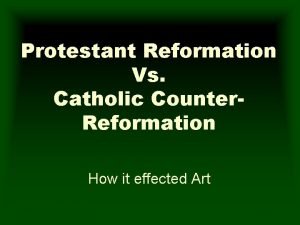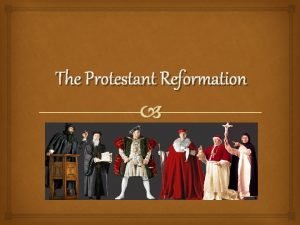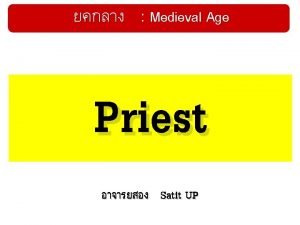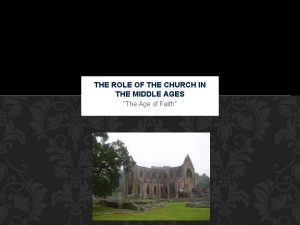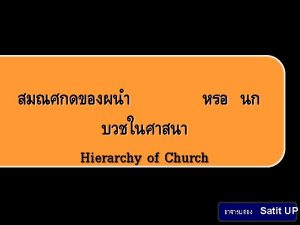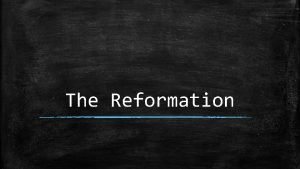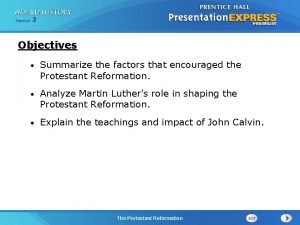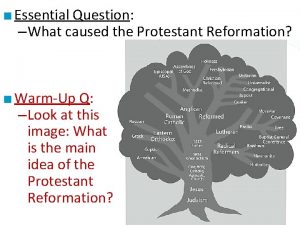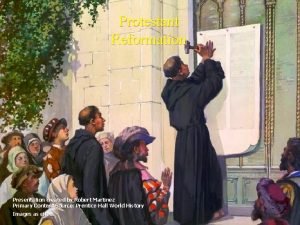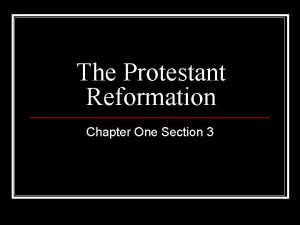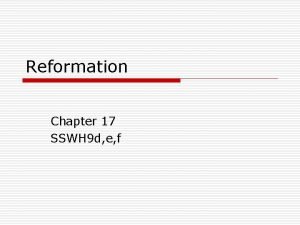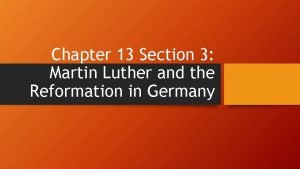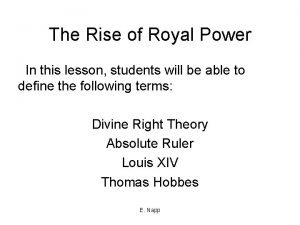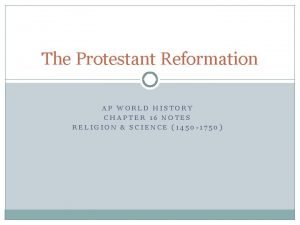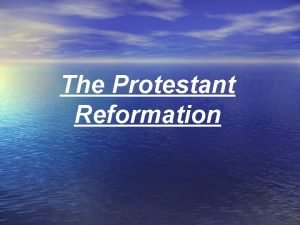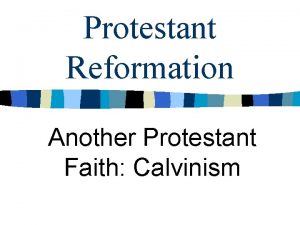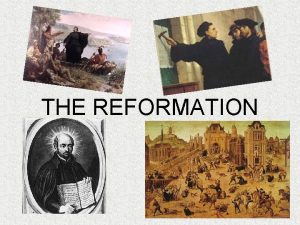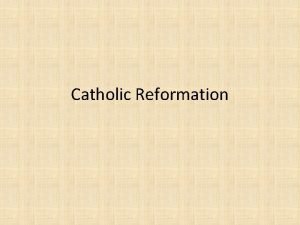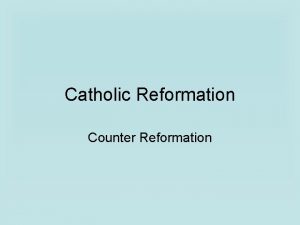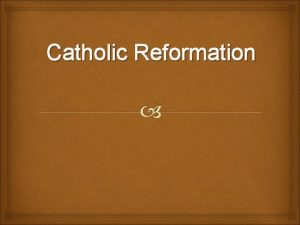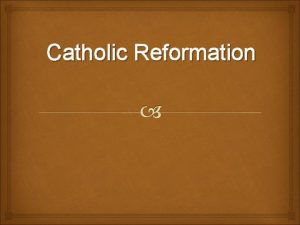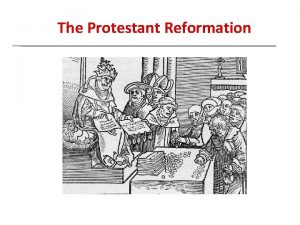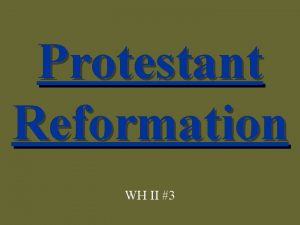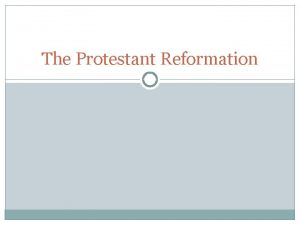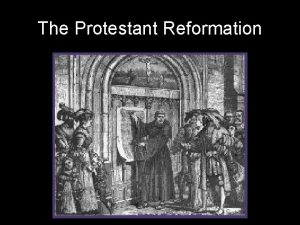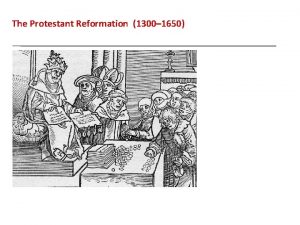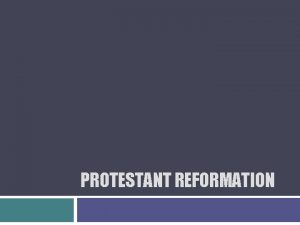The Protestant Reformation Catholic Church hierarchy developed from















- Slides: 15

The Protestant Reformation

Catholic Church hierarchy developed from Roman government was a rigid pyramid/top-down political system When Roman government collapsed, The Church was the only structure left Roman Emperor had been seen as a God/god like Pope seen as link to God/Christ’s representative on earth Do these traits compliment or conflict with Renaissance ideals?

Renaissance Popes Wealth and Political Power Had to defend the Papal States from French and Italian Enemies Lower clergy was often times illiterate and unofficially married As literacy spread during the Renaissance, people began to expect more from their priests

Martin Luther From a copper mining family Father wanted him to be a lawyer When caught in storm, he promised to become a monk Fasted and prayed but still felt like a sinner “The just shall live by faith” Faith alone was needed for salvation

The 95 Theses Prompted by selling of indulgences by Johann Tetzel Posted on the church door in Wittenberg Within 6 months printing presses had spread it all over Germany Called for a full reform of the Catholic Church Did not call for a split from the Church

Three Main Points of Luther’s 95 Theses I. Salvation was by faith alone (not faith and good works) II. Bible was the only authority (not Church tradition) III. Priesthood of all believers (no need for priest class)

Reactions of the Holy Roman Emperor and the Pope Leo X excommunicate s Martin Luther Holy Roman Emperor Charles V sides with the Pope against Luther

Charles V From the Hapsburgs, an Austrian noble family The most powerful man in Europe Won many lands through marriages

European Lands of Charles V

Charles V vs. Protestant Princes German Princes who had remained loyal to Pope signed agreement to join forces against Luther 1529 - German Princes who had agreed with the teachings of Luther signed a protest against this Catholic league of princes and become known as Protestants 1530 - Augsburg Confession signed- asserts main tenants of what will become the Lutheran Church 1531 - The Protestant Princes form the Schmalkaldic League for mutual protection against the Catholic Princes And Holy Roman Emperor Charles V 1544 - Charles V feels safe form the French and Turks and attacks the Schmalkaldic League.

Founders of the Schmalkaldic League Philip I, Landgrave of Hesse John Frederick I, Elector of Saxony

Schmalkaldic War 1546 -1547 - Charles V could never wipe out the Protestant faith with initial military victories even though he won the Schmalkaldic War 1552 - He provoked another revolt of Protestant Princes by trying to force them back into the Catholic Church Charles V flees from superior Protestant forces 1555 - Charles V agrees to the Peace of Augsburg

Peace of Augsburg 1555 Each prince could choose his own religion Catholic or Lutheran. Not Calvinist Retain loyalty to Holy Roman Emperor

Charles V Disillusioned Retires to monastery Gives Spain, Netherlands, Americas to his son, Philip II Gives Holy Roman Empire to his brother, Ferdinand I

Philip II of Spain
 Protestants vs catholics
Protestants vs catholics Protestant hierarchy
Protestant hierarchy What were the final decrees of the council of trent
What were the final decrees of the council of trent Roman catholic church hierarchy pyramid
Roman catholic church hierarchy pyramid Christian church hierarchy pyramid
Christian church hierarchy pyramid Rank in catholic church
Rank in catholic church Protestant reformation kahoot
Protestant reformation kahoot What factors encouraged the protestant reformation?
What factors encouraged the protestant reformation? What caused the protestant reformation?
What caused the protestant reformation? Protestant reformation
Protestant reformation Give up one’s views or beliefs
Give up one’s views or beliefs Counter reformation def
Counter reformation def Unit 3: martin luther & the protestant reformation
Unit 3: martin luther & the protestant reformation Chapter 13 section 3 the protestant reformation
Chapter 13 section 3 the protestant reformation Protestant reformation
Protestant reformation Reformation ap world history
Reformation ap world history
